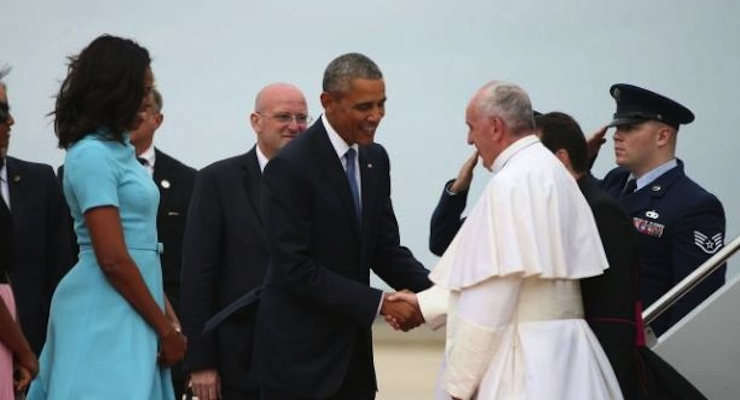

Pope Francis, right, is greeted by President Barack Obama, left, at Andrews Air Force Base in Maryland just outside of D.C. on Sept. 22, 2015. (Photo: AP)
Congressman Thomas Massie, R-Ky., has invited me to the House of Representatives to watch Pope Francis address a joint session of Congress. This generous Methodist congressman has invited your traditionalist Roman Catholic columnist and cable TV guy to this grand event. I am going with joy because the pope is the Vicar of Christ on Earth, and his presence in Congress is historically unique. But within me is fear and trembling over what he might say.
The papacy is an office created personally by Our Lord. Its occupants are direct descendants of St. Peter. Its role and authorities have evolved over the centuries, but the core of its responsibilities has always been the preservation of traditional teachings about faith and morals and safeguarding the sacraments. While the papacy is a monarchy, the teaching authority in the Church is “the bishops under the pope.” This means that a pope intent on change ought to consult with his fellow bishops.
Before the monumental Church changes of the 1960s and 1970s that trivialized the Mass and blurred the distinctions between the clergy and the laity, Popes John XXIII and Paul VI consulted their fellow bishops at Vatican II. The consultations were fractious and belligerent, but both popes got what they wanted: a watering down of liturgical practices and an easing of rules safeguarding the sacraments, so as to make the Church more appealing and accessible to former and to non-adherents.
The result was a disaster. Fewer Catholics went to Mass, confusion about former theological norms reigned, and a general tenor pervaded the faithful that the Church never really meant what it preached. Former Catholics continued to stay away, new Catholics barely showed up, and many traditional faithful became demoralized.
Popes John Paul II and Benedict XVI attempted to roll this back. They succeeded in part by emphasizing traditional orthodoxy and personal piety to youth. Today, Catholic seminaries throughout the world are filled with young men who are more faithful to traditional practices and beliefs than many of their professors are.
Comes now Pope Francis to use moral relativism to take the Church in two dangerous directions. The first is an assault on the family, and the second is an assault on the free market — two favorite political targets of the left.
In the past month, without consulting his fellow bishops, the pope has weakened the sacrament of matrimony by making annulments easier to obtain. The Church cannot grant divorces because Our Lord used his own words to declare valid marriages indissoluble. But it does grant annulments.
An annulment is a judicial finding that a valid marriage never existed. This generally requires a trial, at which the party seeking the annulment must prove the existence of the marital defect from the beginning.
Fair annulment trials are costly and time consuming, often taking years from the initial filing to the final appeal. Until now. Last week, Pope Francis arbitrarily ordered the entire process to be completed in 45 days or fewer. For contested matters, a fair trial in 45 days is impossible. So, to meet his deadline, more annulments will be granted administratively, not on the merits.
It gets worse.
The Church has taught for 400 years that abortion is murder. Because the victim of an abortion is always innocent, helpless and uniquely under the control of the mother, abortion removes the participants from access to the sacraments. Until now. Last week, Pope Francis, without consulting his fellow bishops, ordered that any priest may return those who have killed a baby in a womb to the communion of the faithful. He said he did this because he was moved by the anguished cries of mothers contemplating the murder of their babies.
I doubt he will defend these decisions before Congress. He will, instead, assault the free market, which he blames for poverty, pollution and the mass migrations into Europe away from worn-torn areas in the Middle East.
In his papal exhortation on capitalism, Pope Francis spectacularly failed to appreciate the benefits of capitalism to the health, wealth and safety of the poor. Instead, he has reworked the Peronism of his youth to advocate government-mandated redistribution of wealth and to condemn those who work hard, employ others and achieve wealth — even when they give some of that wealth to the Church.
When he is in St. Patrick’s Cathedral in New York City later this week, he should take note of the recent and beautiful $200 million facelift. It was paid in full by rich Catholic capitalists who employed hardworking artisans and laborers to do the work.
The pope probably also will tell Congress that the world is an inherently unhealthy place because of human work. He will embrace the highly questionable green science of those who want the government to tell us how to live, outside our homes and inside — more Thomas Piketty than St. Thomas Aquinas.
The pope has seriously disappointed those who believe the Roman Catholic Church preserves and teaches the Truth. The Truth is Christ risen and unity with Him. It is not a debate about the minimum wage or air conditioning.
Pope Francis is popular on the world stage, and the crowds love him. But if he fails in his basic duties as the pope, if his concern is more for secular than sacred, if he aids the political agenda of the atheistic left, he is a false prophet leading his flock to a dangerous place, where there is more central planning and less personal liberty.






